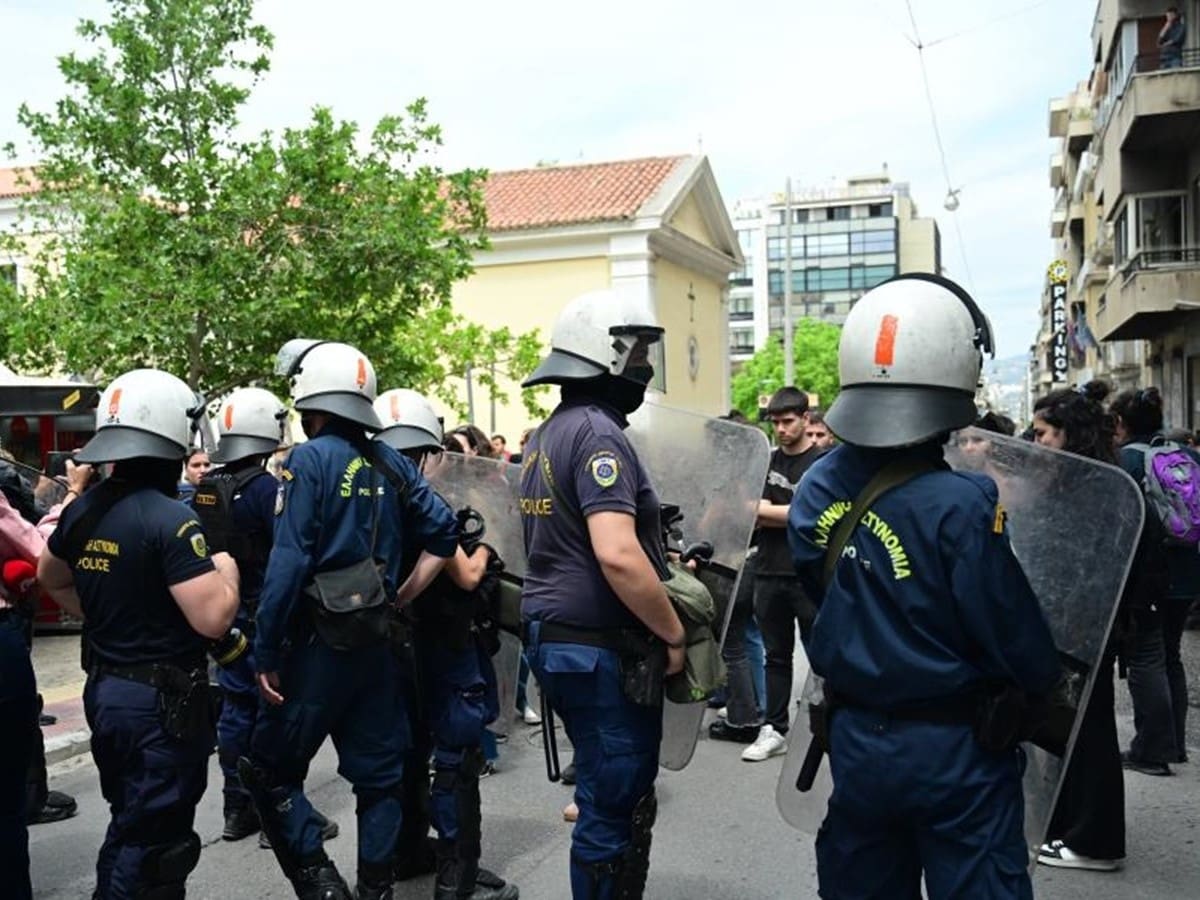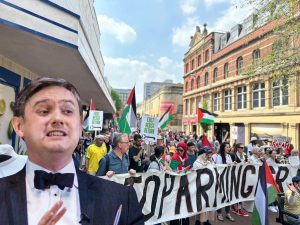On Friday 24 May, 2024, I was one of the three European people released from Amygdaleza Deportation Camp, outside Athens, Greece. Nine non-Greek European passport-holders were amongst 28 people arrested on Tuesday 14 May, during a police raid of the Athens Law School, which had been declared occupied in solidarity with Palestine and in support of al-Aqsa Flood, the ongoing liberation struggle, waged by the Palestinian Resistance, since 7 October.
The occupation of the law school entailed demands for academic boycott and divestment from any affiliated parties supporting or profiting from the Zionist entity’s retaliatory genocidal warfare, witnessed by the world for the last eight months.
After a typically long and inconvenient detention and arrest procedure, followed by a night in the cell, all 28 defendants were declared free to go from the Evelpidon Courthouse, the next day – Nakba Day – pending a postponed hearing for charges of disturbing the peace.
Upon the adjournment of the session, however, the police continued to cuff and detain the nine non-Greek European passport holders and conspired to lie to the legal representatives that the 9 people were required to return to the central police head quarters, where their documents would be checked to determine the ‘legitimacy’ of their presence on Greek territory.
The deception of the ‘law enforcers’ was quickly realised due to the direction of travel; soon, the bus transporting the nine arrived at Allodipon, the immigration processing centre.
Through extrapolation of the circumstances and rumours, the nine people gleaned the possibility they may be facing deportation, although this was never formally expressed by any police official and was only confirmed upon the visitation of lawyers.
Beginning Wednesday 15 May – Nakba Day – the nine people were detained under administrative detention at Amygdaleza Deportation Camp. The subsequent Saturday, all nine people were handed deportation orders, which are currently being challenged; the administrative detention was also appealed. On Friday 24, three people were released from detention, while six remain, awaiting a response, which is anticipated to be delivered on Monday 27 May.
The judge handling my case made their decision quicker than the others, which we were advised could happen. Many of us have visited the various detention camps and centres around Athens, before. Many of our friends have also been held inside such camps. But, it is a different to have been processed and detained, and then to leave the reality behind. I feel sick with rage.
Not just for the comrades with European passports – if they let me out, the others are smooth sailing. But there are many others who’ll spend much longer, under worse conditions, awaiting their fate.
The nine of us were separated from the general population, secluded to a segregated container compound, closed off at each end with barbed wire fencing, we suspected this had something to do with our status as ‘unwanted aliens’ who present a ‘threat to national security’. Seclusion was also no doubt due to fears we’d be exposed to the realities and conditions experienced by non-white, non-European people, despite the aforementioned, preexisting knowledge and interactions with these institutions, which has also been well documented by refugees and migrants.
We had air conditioning, hot water, food delivered by a supportive network of comrades, lawyers on call, access to our phones. While inside, I learned in some camps the police remove inbuilt cameras completely from electronic devices belonging to detained people. Our period of detention was tainted with rage due to this shared understanding of the realities for others.
I received the news that I would be free, while I was on the phone to Abdullah, a friend of mine who lives in Gaza. We had not talked for a while. He conveyed his deep faith in Allah, his family’s resolve to remain, and of course the urgency and necessity of raising funds to survive the unimaginable reality of genocide enacted by the imperialist-backed Zionist entity. I want to sincerely thank everyone who has amplified and donated to his fundraiser.
The place in which Abdullah and his family are currently located, there is nothing; no infrastructure, just tents and makeshift living environments. The IOF-guarded and polluted sea is the only source of water.
His family’s survival is indeed by the grace of God.
Bathing in the sea, eating scarcely, drinking less. Sick, tired and exhausted. Physically and mentally drained. Witness to unspeakable atrocities. We strained a conversation through bad network reception; me from the camp, Abudllah from a particularly exposed and dangerous location. We talked about the fundraiser; how to amplify it; the complications with international money transfers; fundraiser accessibility issues for his Arabic speaking colleagues.
The lawyer said me and two others would be free to go in a few hours. I was interrupted during a precious phone call; we don’t know when – or if – the next one will occur. Abdullah said he would go, to be “safer” – he was at increased risk in the area where internet access can approximately be found. He reiterated the need to purchase an e-sim compatible phone and hung up.
The time came for me to leave the camp. Leave the others behind. Leave the 40 men from various non-European countries, cramped in the containers running parallel to ours, who announced a collective hunger strike in recent days.
The European comrades I left behind have also announced a hunger strike, following the decision to release just three of us today. Like the 40 other detainees, the demands of the hunger strike pertain to the living conditions in the camp, the random and repressive structure of administrative detention and the release of those who remain.
Medical negligence, withholding food, nutritionally-insufficient meals, arbitrary rules and abuse of power as a vehicle for psychological abuse; we experienced all these punitive measures and rights violations in 11 days of administrative detention. For us, it was 11 days. Some will spend months, years… When I think “11 days”, May 2021 comes to mind. Saif al-Quds, the 11-day battle sparked by the Unity Intifada, a collective uprising that erupted across Gaza, West Bank, and inside ‘48, duo to the increased colonial violence in the East Jerusalem neighbourhood of Sheikh Jarrah.
While being held under administrative detention, I thought of my friend Khalid.
I met Khalid through We Are Not Numbers, an initiative in Gaza that provides training and workshops in creative writing, digital journalism, videography and presentation skills. Participants in Gaza and journalists aboard are paired up through a mentorship scheme. I was incredibly lucky to be introduced to Khaled, who had written an article about the Occupation’s use of administrative detention. I learnt then, how the Occupation entangles Palestinian prisoners in an endless loop of torturous incarceration.
At present almost 10,000 Palestinian people – men, women and children – suffer under Zionist lock and key, a number which increased exponentially since 7 October. Prisoners are the compass of the struggle, negotiating their release was one of the principle motivating factors behind the inception of al-ِAqsa flood.
In November, 2023, and multiple times since, the Resistance has indeed been victorious in forcing the Occupation to liberate streams of prisoners, including high profile people like Israa Jaabis. The release of the imprisoned exposed the horrors of detention.
Needless to say, knowing the extent of abuse Palestinians face at the hands of their jailer made my detention at Amygdaleza practically inconsequential.
As I departed the camp, I scrolled through the Resistance News Network; the occupation extended the administrative detention of Wissam Abu Zeid, a Palestinian resistance fighter from the Jenin Brigades, for a further four months. Abu Zeid has been imprisoned since Zionist soldiers failed to assassinate him, almost three years ago. Resistance in the West Bank, and especially in Jenin, has exploded in response to increased IOF invasions, since 7 October.
For those who are not martyred while actively fighting for Palestine, the Occupation prisons – referred to as ‘slaughterhouses’ – are often the locations of slow and painful deaths due to torture, medical negligence, poor sanitation and ‘food’ that is better described as a health hazard. For all these reasons and more, Palestinian prisoners have long harnessed hunger striking as a form of protest, reclaiming their right to bodily autonomy in defiance of the Occupation’s grip on their freedom.
Since 7 October, regimes around the world have resorted to myriad repressive tactics to silence Palestinians and the voices of their allies. Arrest, brutality, torture, administrative detention and deportation have been wielded with increased frequency. Deportation and displacement are weapons of repression straight from by the Zionist playbook.
Since the waves of al-Aqsa Flood engulfed the world, Palestinians from Gaza have been detained in both the West Bank and ’48, with random releases and transfers back to Gaza taking place; hundreds of martyrs have ascended due to torture, malnutrition and medical negligence. Inside Gaza, vicious collective punishment has led to consistent scenes of mass kidnapping, humiliation and execution of civilians.
Mass graves continue to be discovered, revealing decomposing bodies with their hands tied behind their back; wrist ties for babies, children and adults have been unearthed from shallow graves, pitifully covered.
In the weeks before the Athens Law School action, the Hellenic police had cracked down severely on all and any expressions of solidarity with Palestine. On one occasion the mass detention of 42 people from solidarity gatherings outside the courthouse and the police HQ shocked the movement in Athens, highlighting, with utmost clarity, the need to assemble and organise in strong and protective numbers. One arrest followed the detention of 42, which was a pathetic move, aiming to deter and criminalise support for victims of the police state’s fascistic behaviour.
The strategy of deportation is now being leveraged by repressive regimes across the world; last year, Jerusalem-born, French-Palestinian, Saleh Hamouri, was deported to France for his consistent resistance to colonial subjugation in Palestine. This marked a significant shift and revived the spotlight, internationally, on the illegal practice of deportation and the denial of the right to return. The lack of action from the international community and the direct collaboration between the Zionist entity and European regimes has now seen this silencing strategy spread to the European continent.
In recent months, Samidoun Network have launched campaigns for Mohammed al-Khatib and Zaid Abdul-Nassr, who risk the revocation of their residency and refugee statuses, as well as deportation, from Belgium and Germany, respectively.
In Jordan, after weeks of mass mobilisation in support of the Palestinian Resistance have triggered continued police sweeps. Various people were taken hostage by Jordanian authorities, crystalising the traitorous and normalising attitude of the Kingdom and it’s complicity with Zionism.
For Jordanians citizens, the ramifications are bad, but for the refugee community, especially Syrian refugees, who have been ostracised, mistreated and segregated from Jordanian society, the threat of deportation back to a hostile homeland is enough to trigger hunger strikes. Syrian nationals, Wael al-Ashi and Atiya Abu Salem, are just two of the people holding refugee status who face the reality of deportation. Last week, Abu Salem comitted to a hunger strike in protest, as our comrades in Amygdaleza.
Now, retaliation for Palestinian advocacy has become widespread, regardless of nationality, country of origin or documentation. Greece has entered the conversation with its recent move to deceptively administratively detain nine European passport holders, and threaten them with deportation. The decision to do so is, of course, not a deterrent for determined strugglers, but a catalyst for robust resistance and refusal to submit to techniques of silencing.
While we witness the same fascist and intolerant practice rolling out across continents, it’s crucial to remember the impact will never be the same for everyone. Deporting Europeans back to France, Italy, Spain, the U.K and even Germany is a mere inconvenience, as opposed to a fearful prospect with deathly potential. In the US, international students participating in university campus uprisings are also increasingly facing threats to their immigration status and visas.
During our time at Amydaleza, the authorities withheld food, refused access to visitors from outside, enacted medical negligence, prevented access to doctors, psychological support and other basic rights. Despite this, there was an ever-present cognizance of the dramatically different effect these abuses of power can have.
The role Egypt plays in besieging Gazans, for example, through the application of restrictions on goods, services and rights violations. The decision of Egyptian authorities to prevent aid and access to Gaza has exacerbated the impact of the Occupation’s maniacal obliteration of all life-sustaining infrastructure, including disabling the healthcare system through incessantly bombing hospitals.
Waves of starvation and sickness have spread rapidly across the strip due to Egypt’s prevention of aid and healthcare. This, twinned with the policies of extortion and bribery amounting to human trafficking, perpetrated at the Rafah crossing by the spineless Sisi regime, condemns Palestinians to confront their murderous oppressor with no way out.
This despicable cheapening of Palestinian life contradicts the vast sums of money demanded for emergency evacuation through Rafah. This exorbitant cruelty puts a price tag on the right to seek safety from genocide, to the tune of thousands of dollars, depending on the size of families wishing to leave.
The cost is inhumane and inconceivable, especially for a population of people who’ve spent eight months livestreaming their mass murder to little effect. The millions of social media followers who have borne witness, digitally, to the genocide are now rallying to share fundraisers, which aim expressly to raise money for the corrupted movement of people.
These fundraisers are a veritable point of contention – from calls to boycott Zionist Go Fund Me, to abhorrent reports of disingenuous people stealing funds they assisted in raising – the fundraising last resort accentuates the crucial need to destroy and build alternative’s to the pervasive hegemony of racial capitalism.
The tentacular spread of fascism, emanating from the beastly body of imperialism, grows audaciously each time the popular masses submit to repressive control by ‘authorities’ and governments. These entities pacify and condition their citizens – beneficiaries of exploitation – while scrambling to protect their economic and political interests. But, increased repression with always entail increased resistance. The call to escalate for Palestine is echoing around the world, strengthened by each reverberation.
Actions and movements aiming to break international support and involvement in the genocide are increasing, not only in frequency, but also in militancy. As the wider axis of armed resistance across the Arab world continues to overwhelm the capabilities of the Occupation Forces, it is the duty of every person outside Palestine to heed the calls of the Palestinian people and their resistance.
Now is the time to locate our positionalities in the struggle for collective liberation and to act upon our revolutionary duties. By any means necessary, we owe it to the Palestinian people to sacrifice and defy our personal, social, vocational, economical and political involvement in genocide.
Actions speak louder than words, but never forget: silence is violence – don’t stop talking about Palestine.
Featured image supplied




